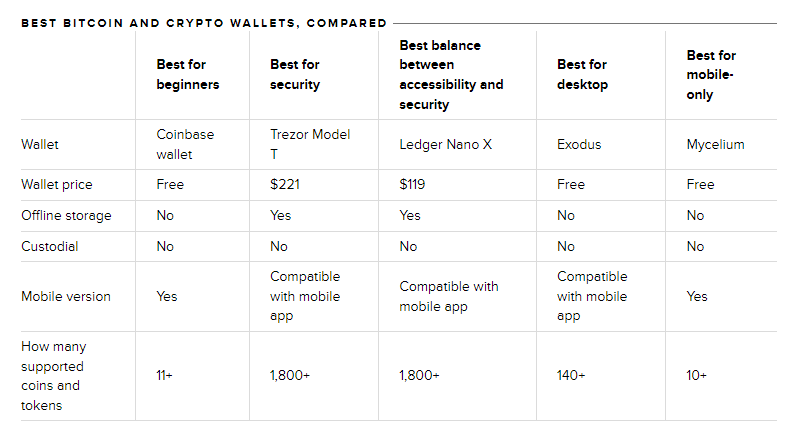Interested in investing in bitcoin or another cryptocurrency? Consider a cryptocurrency wallet.
Given that we're discussing digital cash, the term "wallet" is a figure of speech. A cryptocurrency wallet can be physical hardware or software placed on your computer, smartphone, or in the cloud that serves as a secure place to keep your evidence of ownership. Well-known platforms such as Robinhood, PayPal, and Venmo let you purchase bitcoin and other cryptocurrencies instantly and with no technical knowledge. However, the majority of these online services and their associated cryptocurrency wallets are "custodial," which means you're putting your confidence in the firm to safeguard, preserve, and keep your money. Finally, they have power, and your cryptocurrency is in their hands.
As a result, unless you're conducting a daily crypto transaction or have a little amount of money involved, we don't advocate storing your bitcoin in an exchange account. Investing in a hardware wallet for offline storage is the best approach. A "noncustodial" software wallet or wallet app is the next best option, as it gives you more control over your digital assets. In our search for the best crypto wallet, we'll take a look at both.
Greater independence, in any scenario, entails responsibility: You'll need to maintain track of your own private key, which is the crypto equivalent of a strong password. You'll also need to decide which is more important: accessibility or security. A hot wallet holds bitcoin online; a cold wallet is separated from the internet, providing additional security against hackers but necessitating a few more steps every time you wish to execute a cryptocurrency transaction. Continue reading to find out which wallet is perfect for you.
Trezor Model T
Best for security

Trezor Suite, the company's new user interface, was released earlier this month, replacing the company's Wallet Web app. As a result, this study reflects our initial impression of a new product. Trezor, on the other hand, has been around for quite some time, having been founded in 2011 as a subsidiary of Czech-based SatoshiLabs.
The $221 Model T is Trezor's 2nd-generation hardware wallet, and it shares many of the same capabilities as the Ledger Nano X, which is discussed more below. One significant distinction is that Trezor's software is totally open-source, which provides some additional safety – at least theoretically: the code that drives the wallet is available for examination, and sunshine, the idea goes, is the best disinfectant.
Trezor Suite is meant to operate directly on your desktop, which provides more protection than a web-based program, however, you can also access it via the company's website. Trezor wallets presently handle over 1,600 currencies and tokens, and transactions may be completed directly in Trezor Suite using the company's integrated exchange.
The Model T, which is shaped like an old-school stopwatch, has a touchscreen and a USB cord to connect to your computer; it also includes a microSD card if you want to add secured storage straight to your hardware wallet. However, it lacks Bluetooth compatibility, which some security advocates prefer because Bluetooth connectivity might be used as an attack vector by hackers.
Coinbase Wallet
Best for beginners

The most well-known cryptocurrency exchange in the United States is Coinbase, which went public in April. The startup makes it simple to trade popular cryptocurrencies such as bitcoin and dogecoin, and it has its own Visa-backed debit card that works with Apple Pay and Google Pay.
The Coinbase Wallet is a wonderful place to start if you're new to cryptocurrencies. It is available as an app for Android and iOS, the interface is simple, and the wallet is completely connected with the company's exchange, making it simple to execute transactions, including the purchase of coins and tokens using traditional cash.
Unlike the company's exchange, the Coinbase Wallet is noncustodial; that is, only you have access to your wallet's private key, which is produced when you sign up with a 12-word recovery phrase. It's important to understand the distinction between holding your bitcoin on Coinbase's exchange, which is custodial, and the wallet, which is not. However, their connection makes it quite straightforward to move payments back and forth.
Exodus
Best for desktop users

Exodus is a hot wallet, which means your assets are held online; nevertheless, it is non-custodial, which means only you have access to your private key, which is a 12-word password phrase that safeguards access to your crypto assets.
The Exodus wallet is meant to function on Mac, Windows, and Linux desktops, but there is an Android and iOS companion app available. The desktop user interface is sleek and simple to grasp. Your wallet is completely linked with the Exodus exchange, making transfers simple.
Exodus accepts over 130 different forms of cryptocurrencies, including bitcoin, ether, tether USD, and dogecoin. However, the trade has certain notable limitations: If you wish to buy crypto using US dollars and keep it in the Exodus wallet, you must first buy the asset on a centralized crypto exchange like Coinbase and then transfer the assets to Exodus. Bitcoin may be purchased with US dollars in the app version. And once you have an asset in your wallet, you can quickly trade it for other assets that are supported. While the wallet is free to use, Exodus charges a fee for transactions completed through its exchange.
Hot storage wallets are usually regarded as less safe than cold storage wallets, and some Exodus users may choose to upgrade to cold storage in the future. The good news is that Exodus works well with Trezor's One and Model T hardware.
Mycelium
Best for mobile-only users

Mycelium has been around since the dawn of the cryptocurrency age, and the Mycelium wallet is one of the earliest and most well-known bitcoin wallets. This is a mobile-only wallet (there is no desktop version yet) that works on both Android and iOS.
Although the Mycelium wallet has an appealingly basic UI, it supports fewer types of cryptocurrency than the others evaluated here: You may send and receive bitcoin, ether, and ERC-20 tokens like tether USD, USD Coin, and Binance USD, but not the hundreds of esoteric currencies that have emerged in recent years. You may purchase and sell bitcoin straight in the app, and Mycelium accepts standard fiat currencies for purchasing bitcoin.
Because the Mycelium wallet is non-custodial, you will have complete control over your private key and PIN. This wallet is also the only totally open-source hot storage wallet on our list. Though there are security benefits, it also has limited tech support choices; if you get stuck, you may submit a help request to the email address stated at the bottom of the homepage.
For more sophisticated users, Mycelium supports QR codes, allows you to define custom transaction fees, and is compatible with Trezor, Ledger, and KeepKey hardware wallets.
Ledger Nano X
A good combination of accessibility and security

The Ledger Nano X is the company's 2nd-generation cold storage wallet. More than 1,800 currencies and tokens, including bitcoin, ether, and XRP, are supported via the integrated Ledger Live platform, which is simple to understand and use. The wallet may be connected to your computer via USB cable and to Android and iOS mobile devices through Bluetooth, something the Model T does not have.
The item is well-made and has a tiny LED screen. To begin, create a PIN, followed by a 24-word seed phrase. The seed phrase serves as the private key for your wallet. You won't lose your crypto assets if you keep the private key secure, just like you wouldn't lose them if you lost your wallet.
It's worth noting that Ledger experienced a data breach in July 2020, which resulted in the theft of certain customers' personal data but not their crypto holdings. Although no private keys to wallets were obtained, clients reported getting phishing emails and other fraudulent threats as a result. Having said that, Ledger has long been a reputable brand in the crypto industry, but the data leak serves as a good warning to be cautious online, especially when dealing with crypto assets.
Do I need a crypto wallet?
If you want to invest in cryptocurrencies, you need to get a wallet first. Having said that, if you're just getting your feet wet, services like PayPal and Robinhood enable you to buy a coin or fractions of a coin and keep it on their servers. These are custodial wallets, which means you don't have access to the private key. Noncustodial wallets are recommended for long-term bitcoin users and investors.
How much money do I need to start a crypto wallet?
It is conditional. Hardware wallets often cost between $100 and $200, but many software wallets are free. Most do not necessitate the possession of any cryptocurrency.
Which crypto wallet is best for beginners?
We recommend Coinbase Wallet if you've never used cryptocurrency before. Coinbase is a well-known, US-based cryptocurrency exchange that is simple to use and compatible with Coinbase Wallet.
What's the safest crypto wallet?
When compared to a hot storage wallet, cold storage wallets are typically believed to be a more secure option to keep bitcoin. We recommend utilizing a cold wallet if you intend to keep a big volume of coins or tokens for an extended period of time.
Which wallet is ideal for experienced users?
Because today's cold storage wallets can be rapidly and readily connected to the internet for fast transactions, most sophisticated users are likely to be interested in a cold storage wallet. Ledger and Trezor hardware wallets are also solid choices.




Comments (0)